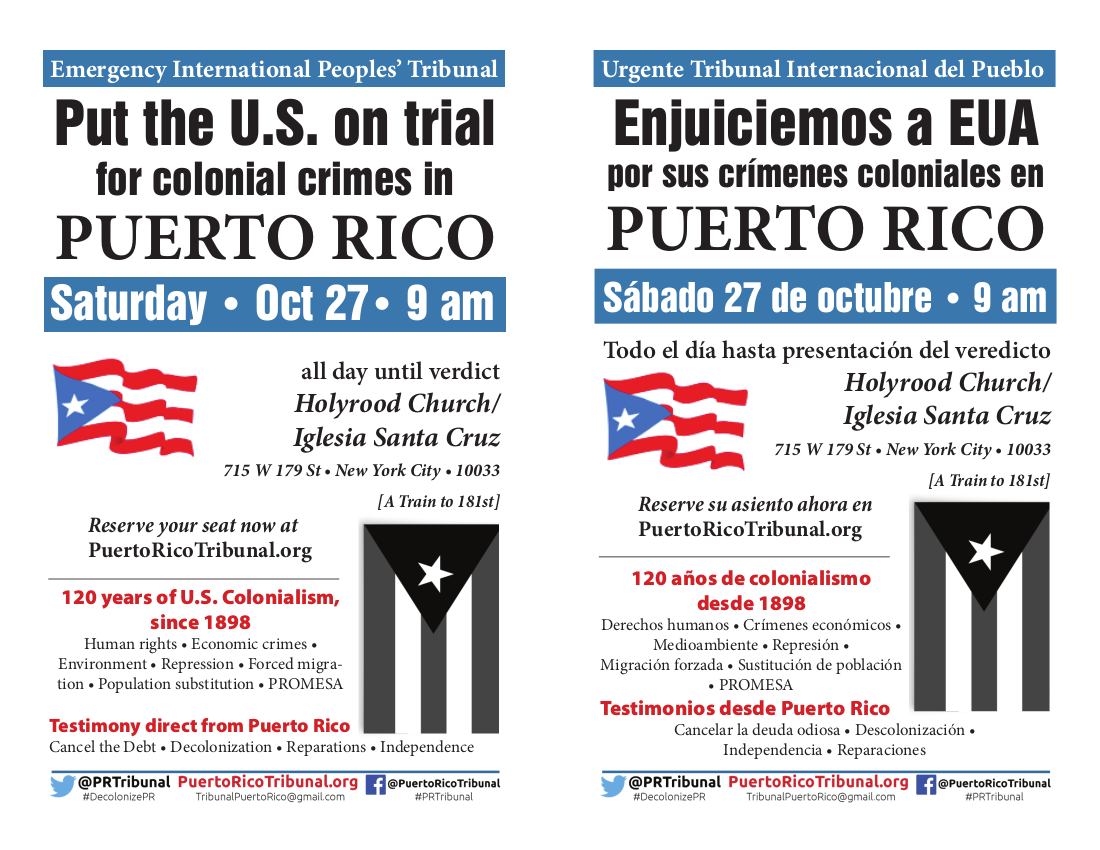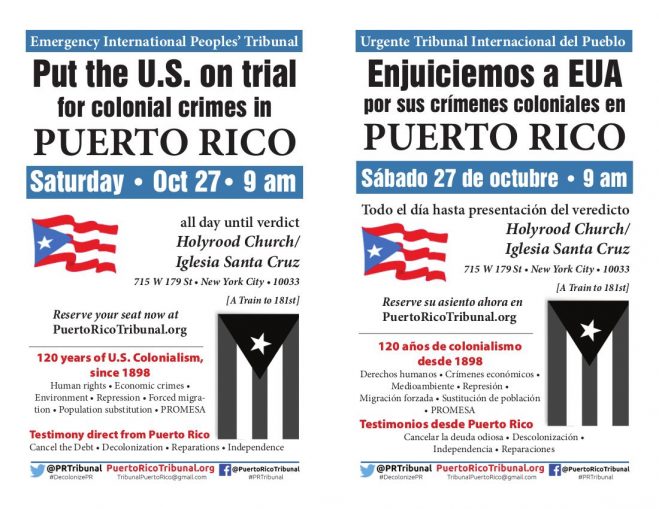



Workers World: What is the reaction in Puerto Rico to the Tribunal?
Berta Joubert-Ceci: The reaction has been tremendous. People feel this is very important. They have been silenced for so long. They want to have their voices heard on an international level when so many lies and misconceptions have been put out on what is really happening there.
Participants from many parts of Puerto Rico are coming to New York to testify. The Tribunal is seen as a vehicle to denounce the crimes of colonialism — whether by the military, the pharmaceutical companies or the AES energy company. When we talk about U.S. crimes in Puerto Rico, we are talking about crimes being committed right now.
A much longer tribunal would be needed to detail all 120 years of U.S. colonial crimes. The people in Puerto Rico are viewing this as an emergency tribunal to expose the tip of the iceberg. Puerto Rican radio stations have requested interviews about the Tribunal.
WW: Who are some of the people coming from the island to testify?
Joubert-Ceci: Eva Ayala, a teacher from the union EDUCAMOS, is speaking on the fight for public education.
Mariana Nogales, the lawyer for Nina Droz, will speak on her case. Droz is a young person arrested on May Day 2017, accused of attempting to set fire to the concrete Banco Popular building with a match. It’s a ridiculous charge, but she is in a U.S. federal prison as an example to intimidate the resistance in Puerto Rico.
Also testifying about repression are #SeAcabaronLasPromesas activists in the forefront of opposing the Fiscal Control Board.
The government has made it a crime to resist, to fight back against imperialism and colonialism. Nina Droz’s case is an example of the many Puerto Rican political prisoners jailed or killed for struggling for independence. The United States fought for independence, but this has been denied to us in Puerto Rico.
Representatives from several cities in the south of the island, like Guayama and Peñuelas, will testify on coal ash and the role of AES in environmental contamination now impacting 14 municipalities throughout the region. Salvador Tió will testify about the pollution of bioengineering companies, like notorious Monsanto.
Ismael Guadalupe, a leader of the Vieques struggle, will testify on the consequences of the U.S. bombing of Vieques and illnesses that resulted. Carlos Zenón, whose family was the first to be evicted to build the U.S. military base in Vieques, will testify by video.
Researcher Ana María Garcia, producer of a very well-known documentary on the forced sterilization of Puerto Rican women, “La Operación,” will also testify by video.
WW: Who are the prosecutor
and jurors?
Joubert-Ceci: The charges against the United States will be leveled by prosecutor Dr. Augusto Zamora, an international lawyer from Nicaragua. He took a case on U.S. violations of Nicaraguan sovereignty to the International Court and won a judgment against the U.S.
A panel of jurors will examine the testimony and render a verdict: They include Nieves Moreno, a Chilean woman political exile who was tortured by the Pinochet dictatorship and testified in the prosecution of Augusto Pinochet, the U.S.-installed Chilean dictator; Bernadette Ellorin from the New York chapter of the Filipino organization BAYAN-USA, which is battling U.S. domination in the Philippines; Ajamu Baraka from Black Alliance for Peace and an internationally recognized leader of the U.S. human rights movement who has worked to apply the international human rights framework to social justice advocacy in the U.S.; Andre Francois, president of Steelworkers Local 8751, Boston School Bus Union and a leader in the local Haitian community.
Others include Deirdre Griswold, editor of Workers World newspaper, author of “Indonesia: The Second Greatest Crime of the Century,” chair of the 1966 Public Inquest on the Indonesian massacres, and an organizer of the 1967 Bertrand Russell War Crimes Tribunal on the U.S. role in Vietnam; Gerardo Cajamarca, a Colombian union organizer now in exile after death threats; and the Rev. Luis Barrios, a professor at John Jay College of Criminal Justice and pastor of Holyrood Church/Iglesia Santa Cruz, which is the Tribunal venue and provides a sanctuary and organizing center for many New York communities.
WW: The governor of Puerto Rico, Ricardo Rosselló, just announced he would allow the city of Ponce to be used as a staging area for a U.S.-backed Venezuelan opposition. Your comment?
Joubert-Ceci: Historically, the government of Puerto Rico facilitates the domination of PR by the United States. That is the role of a governor in a colony.
The U.S. wants to reconquer Venezuela. First came the destabilization campaign. Then the Organization of American States zeroed in on Venezuela, the U.S. imposed sanctions and Trump declared that a military invasion is an option.
There are many theories. Some speculate on an agreement between Rosselló and Trump to advance a pro-statehood agenda. I think that is irrelevant.
Rosselló is carrying out U.S. orders. He had the nerve to call a press conference with Antonio Ledezma, a Venezuelan terrorist, to announce this move. This is another example of Rosselló working against the people of Puerto Rico since day one.
The people are against what the governor is doing. Indignation against that press conference came first from the progressive movement, then others immediately took to social media opposing the statement and action of the governor. A demonstration took place in solidarity with Bolivarian Venezuela. Outrage continues to be expressed on radio shows, in conversations and on social media against putting U.S. interests above the needs of Puerto Rico.
Venezuela is not the enemy. These sisters and brothers offered hurricane relief that was rejected by the governor because of PR’s condition as a U.S. colony. Venezuela offered a shipload of diesel fuel free of charge when generators needed fuel. Uruguay, Mexico and Cuba offered solidarity, which also was blocked.
Puerto Rico has always been a U.S. laboratory for many things: to experiment with birth control pills; a laboratory of militarization, like Vieques; invasions, like Santo Domingo, Grenada, Panama. What happens in Puerto Rico doesn’t stay in Puerto Rico.
Right-wing governments now installed across Latin America are part of the environment in which the colonial government of Puerto Rico is being used against Venezuela. The U.S. views Puerto Rico as a laboratory, and will try to impose fiscal control boards, like the one they are trying out in Puerto Rico, in other places.
The Emergency Tribunal is a step in building solidarity to close down the imperialist laboratory.
For more information or to reserve space at the Oct. 27 Tribunal, go to PuertoRicoTribunal.org.
Boston Baristas at Blue Bottle coffee shops in Boston are so fed up with their…
En su continua campaña genocida contra el pueblo palestino, Israel utilizó aviones no tripulados el…
Israeli military veteran in Warsaw: ‘Liberate all ghettos’ By Michael Kramer On the 82nd anniversary…
The Vietnamese revolution to liberate its country from imperialism had a decisive victory 50 years…
The epic struggle of the Palestinian people against the full weight of U.S. imperialism and…
The following report comes from the Bronx Anti-War Coalition organizers on a protest held in…